Alan Freed (1921-1965)
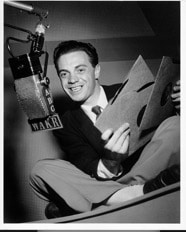 Alan Freed was an American disc jockey. He became internationally known for promoting the mix of blues, country, and rhythm and blues music on the radio in the United States and Europe under the name of rock and roll. His career was destroyed by the payola scandal that hit the broadcasting industry in the early 1960s.
Alan Freed was an American disc jockey. He became internationally known for promoting the mix of blues, country, and rhythm and blues music on the radio in the United States and Europe under the name of rock and roll. His career was destroyed by the payola scandal that hit the broadcasting industry in the early 1960s.
Freed is commonly referred to as the “father of rock ‘n’ roll” due to his promotion of the style of music, and his introduction of the phrase “rock and roll”, in reference to the musical genre, on mainstream radio in the early 1950s. He helped bridge the gap of segregation among young teenage Americans, presenting music by African-American artists (rather than cover versions by white artists) on his radio program, and arranging live concerts attended by racially mixed audiences. Freed appeared in several motion pictures as himself. In the 1956 film Rock, Rock, Rock, Freed tells the audience that “rock and roll is a river of music which has absorbed many streams: rhythm and blues, jazz, ragtime, cowboy songs, country songs, folk songs. All have contributed greatly to the big beat.”
WAKR Akron
In 1945 Alan Freed joined WAKR and became a local favorite, playing hot jazz and pop recordings. The radio editor for the Akron Beacon Journal followed Freed and his “Request Review” nightly program of dance. When he left the station, the non-compete clause in his contract limited his ability to find work elsewhere, and he was forced to take the graveyard shift at Cleveland’s WJW radio where he eventually made history playing the music he called “Rock and Roll.”
WJW Cleveland
In the late 1940s, while working at WAKR (1590 AM) in Akron, Ohio, Freed met Cleveland record store owner Leo Mintz. Record Rendezvous was one of Cleveland’s largest record stores, who had begun selling rhythm and blues records. Mintz told Freed that he had noticed increased interest in the records at his store, and encouraged him to play them on the radio. In 1951, Freed moved to Cleveland and, in April 1951, he was under a non-compete with WAKR. However, through the help of William Shipley the RCA distributor in Northern Ohio, he was released from his non-compete and joined WJW radio on a midnight radio program sponsored by Main Line, the RCA Distributor and Record Rendezvous. Freed peppered his speech with hipster language and with a rhythm and blues record called “Moondog” as his theme song, broadcast R&B hits into the night.
Mintz proposed buying airtime on Cleveland radio station WJW (850 AM) to be devoted entirely to R&B recordings, with Freed as host. On July 11, 1951, Freed started playing rhythm and blues records on WJW. Freed called his show “The Moondog House” and billed himself as “The King of the Moondoggers”. He had been inspired by an offbeat instrumental called “Moondog Symphony” that had been recorded by New York street musician Louis T. Hardin, aka “Moondog”. Freed adopted the record as his show’s theme music. His on-air manner was energetic, in contrast to many contemporary radio presenters of traditional pop music, who tended to sound more subdued and low-key in manner. He addressed his listeners as if they were all part of a make-believe kingdom of hipsters, united in their love for black music. He also began popularizing the phrase “rock and roll” to describe the music he played.
Later that year, Freed promoted dances and concerts featuring the music he was playing on the radio. He was one of the organizers of a five-act show called “The Moondog Coronation Ball” on March 21, 1952, at the Cleveland Arena. This event is known as the first rock and roll concert. Crowds attended in numbers far beyond the arena’s capacity, and the concert was shut down early due to overcrowding and a near-riot. Freed gained a priceless notoriety from the incident. WJW immediately increased the airtime allotted to Freed’s program, and his popularity soared.
In those days, Cleveland was considered by the music industry to be a “breakout” city, where national trends first appeared in a regional market. Freed’s popularity made the pop music business take notice. Soon, tapes of Freed’s program began to air in the New York City area over station WNJR/1430 (now WNSW) Newark, New Jersey.
WINS New York
In 1954, following his success on the air in Cleveland, Freed moved to WINS (1010 AM) in New York City. Hardin, the original Moondog, later took a court action suit against WINS for damages against Freed for infringement in 1956, arguing prior claim to the name “Moondog”, under which he had been composing since 1947. Hardin collected a $6,000 judgement from Freed, as well as an agreement to give up further usage of the name Moondog.[10] WINS eventually became an around-the-clock Top 40 rock and roll radio station, and would remain so until April 19, 1965—long after Freed left and three months after he had died— when it became an all-news outlet.
Bill Graham (1931-1991)
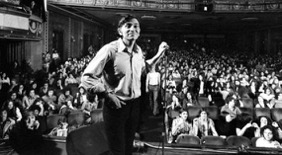 Bill Graham was a German-American impresario and rock concert promoter from the 1960s until his death in 1991 in a helicopter crash. On July 4, 1939 he was sent from Germany to France to escape the Holocaust. At age 10 he settled in a foster home in the Bronx, New York. Graham graduated from DeWitt Clinton High School and from City College with a business degree.
Bill Graham was a German-American impresario and rock concert promoter from the 1960s until his death in 1991 in a helicopter crash. On July 4, 1939 he was sent from Germany to France to escape the Holocaust. At age 10 he settled in a foster home in the Bronx, New York. Graham graduated from DeWitt Clinton High School and from City College with a business degree.
In the early 1960s, he moved to San Francisco, and, in 1965, began to manage the San Francisco Mime Troupe. He had teamed up with local Haight Ashbury promoter Chet Helms and Family Dog, and their network of contacts, to organize a benefit concert, then promoted several free concerts. This eventually turned into a profitable full-time career and he assembled a talented staff. Graham had a profound influence around the world, sponsoring the musical renaissance of the ’60s from the epicenter, San Francisco. Chet Helms and then Bill Graham made famous the Fillmore and Winterland Arena; these turned out to be a proving grounds for rock bands and acts of the San Francisco Bay area including the Grateful Dead, Jefferson Airplane, and Big Brother and the Holding Company with Janis Joplin, who were first managed, and in some cases developed, by Chet Helms.
Brian Jones (1942-1969)
Brian Jones was an English musician, the founder and the original leader of the Rolling Stones.
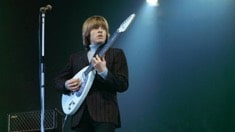 Although he was originally the leader of what was supposed to be a blues-oriented band, Jones’ fellow band members Mick Jagger and Keith Richards took over the band’s musical direction, especially after they became a successful songwriting team. Jones developed a serious drug problem over the years and his role in the band steadily diminished. The band asked Jones to leave the Rolling Stones in June 1969 and guitarist Mick Taylor took his place in the group. Jones died less than a month later by drowning in the swimming pool at his home on Cotchford Farm in Hartfield, East Sussex.
Although he was originally the leader of what was supposed to be a blues-oriented band, Jones’ fellow band members Mick Jagger and Keith Richards took over the band’s musical direction, especially after they became a successful songwriting team. Jones developed a serious drug problem over the years and his role in the band steadily diminished. The band asked Jones to leave the Rolling Stones in June 1969 and guitarist Mick Taylor took his place in the group. Jones died less than a month later by drowning in the swimming pool at his home on Cotchford Farm in Hartfield, East Sussex.
Keith Moon (1946-1978)
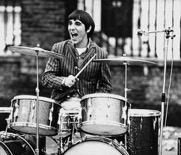 Keith Moon was an English drummer who played with the English rock band the Who. He was noted for his unique style and his eccentric, often self-destructive behaviour. His drumming continues to be praised by critics and musicians. He was posthumously inducted into the Modern Drummer Hall of Fame in 1982, becoming only the second rock drummer to be chosen, and in 2011, Moon was voted the second-greatest drummer in history by a Rolling Stone readers’ poll.
Keith Moon was an English drummer who played with the English rock band the Who. He was noted for his unique style and his eccentric, often self-destructive behaviour. His drumming continues to be praised by critics and musicians. He was posthumously inducted into the Modern Drummer Hall of Fame in 1982, becoming only the second rock drummer to be chosen, and in 2011, Moon was voted the second-greatest drummer in history by a Rolling Stone readers’ poll.
Moon grew up in Alperton, a suburb of Wembley, in Middlesex, and took up the drums during the early 1960s. After playing with a local band, the Beachcombers, he joined the Who in 1964 before they recorded their first single. Moon remained with the band during their rise to fame, and was quickly recognized for his drumming style, which emphasized tom-toms, cymbal crashes, and drum fills. He occasionally collaborated with other musicians and later appeared in films, but considered playing in the Who his primary occupation and remained a member of the band until his death. In addition to his talent as a drummer, however, Moon developed a reputation for smashing his kit on stage and destroying hotel rooms on tour. He was fascinated by blowing up toilets with cherry bombs or dynamite, and by destroying television sets. Moon enjoyed touring and socializing, and was bored and restless when the Who were inactive. His 21st birthday party in Flint, Michigan, has been cited as a notorious example of decadent behaviour by rock groups.
Moon suffered a number of setbacks during the 1970s, most notably the accidental death of chauffeur Neil Boland and the breakdown of his marriage. He became addicted to alcohol, particularly brandy and champagne, and acquired a reputation for decadence and dark humour; his nickname was “Moon the Loon.” After moving to Los Angeles with personal assistant Peter “Dougal” Butler during the mid-1970s, Moon recorded his only solo album, the poorly received Two Sides of the Moon. While touring with the Who, on several occasions he passed out on stage and was hospitalized. By their final tour with him in 1976, and particularly during production of The Kids Are Alright and Who Are You, the drummer’s deterioration was evident. Moon moved back to London in 1978, dying in September of that year from an overdose of Heminevrin, a drug intended to treat or prevent symptoms of alcohol withdrawal.
Jerry Garcia (1942-1995)
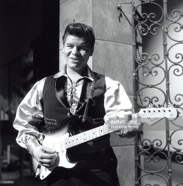 Jerry Garcia was an American singer-songwriter and guitarist, best known for his work as the lead guitarist and as a vocalist with the band the Grateful Dead, which came to prominence during the counterculture era in the 1960s. Although he disavowed the role, Garcia was viewed by many as the leader or “spokesman” of the group.
Jerry Garcia was an American singer-songwriter and guitarist, best known for his work as the lead guitarist and as a vocalist with the band the Grateful Dead, which came to prominence during the counterculture era in the 1960s. Although he disavowed the role, Garcia was viewed by many as the leader or “spokesman” of the group.
One of its founders, Garcia performed with the Grateful Dead for their entire thirty-year career (1965–1995). Garcia also founded and participated in a variety of side projects, including the Saunders–Garcia Band (with longtime friend Merl Saunders), the Jerry Garcia Band, Old and in the Way, the Garcia/Grisman acoustic duo, Legion of Mary, and the New Riders of the Purple Sage (which Garcia co-founded with John Dawson and David Nelson). He also released several solo albums, and contributed to a number of albums by other artists over the years as a session musician. He was well known for his distinctive guitar playing and was ranked 13th in Rolling Stone’s “100 Greatest Guitarists of All Time” cover story.
Later in life, Garcia was sometimes ill because of his diabetes, and in 1986 went into a diabetic coma that nearly cost him his life. Although his overall health improved somewhat after that, he continued to struggle with longstanding heroin and cocaine addictions,[4][5] and was staying in a California drug rehabilitation facility when he died of a heart attack in August 1995 at the age of 53.
George Harrison (1943-2001)
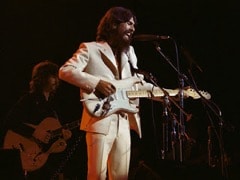 George Harrison was an English guitarist, singer-songwriter, and producer who achieved international fame as the lead guitarist of The Beatles. Often referred to as “the quiet Beatle”, Harrison embraced Hinduism and helped broaden the horizons of his fellow band mates as well as their American audience by incorporating Indian instrumentation in their music.
George Harrison was an English guitarist, singer-songwriter, and producer who achieved international fame as the lead guitarist of The Beatles. Often referred to as “the quiet Beatle”, Harrison embraced Hinduism and helped broaden the horizons of his fellow band mates as well as their American audience by incorporating Indian instrumentation in their music.
Although most of the Beatles’ songs were written by John Lennon and Paul McCartney, most Beatles albums from 1965 onwards contained at least two Harrison compositions. His songs for the group included “Taxman”, “Within You Without You”, “While My Guitar Gently Weeps”, “Here Comes the Sun” and “Something”, the last of which became the Beatles’ second-most covered song.
Harrison’s earliest musical influences included George Formby and Django Reinhardt; Carl Perkins, Chet Atkins and Chuck Berry were subsequent influences. By 1965, he had begun to lead the Beatles into folk rock through his interest in The Byrds and Bob Dylan, and towards Indian classical music through his use of the sitar on “Norwegian Wood (This Bird Has Flown)”. Having initiated the band’s embracing of transcendental meditation in 1967, he subsequently developed an association with the Hare Krishna movement. After the band’s break-up in 1970, Harrison released the triple album All Things Must Pass, a critically acclaimed work that produced his most successful hit single, “My Sweet Lord”, and introduced his signature sound as a solo artist, the slide guitar. He also organized the 1971 Concert for Bangladesh with Indian musician Ravi Shankar, a precursor for later benefit concerts such as Live Aid. In his role as a music and film producer, Harrison produced acts signed to the Beatles’ Apple record label before founding Dark Horse Records in 1974 and co-founding HandMade Films in 1978.
Harrison released several best-selling singles and albums as a solo performer, and in 1988 co-founded the platinum-selling supergroup the Traveling Wilburys. A prolific recording artist, he was featured as a guest guitarist on tracks by Badfinger, Ronnie Wood, and Billy Preston, and collaborated on songs and music with Dylan, Eric Clapton, Ringo Starr and Tom Petty, among others. Rolling Stone magazine ranked him number 11 in their list of the “100 Greatest Guitarists of All Time”. He is a two-time Rock and Roll Hall of Fame inductee – as a member of the Beatles in 1988, and posthumously for his solo career in 2004.
Harrison’s first marriage, to model Pattie Boyd in 1966, ended in divorce in 1977. The following year he married Olivia Harrison (née Arias), with whom he had one son, Dhani. Harrison died in 2001, aged 58, from lung cancer attributed to years of cigarette smoking. His body was cremated and his ashes were scattered in the Ganges and Yamuna rivers in India, in a private ceremony according to Hindu tradition. He left an estate of almost £100 million.
Carl Perkins (1932-1998)
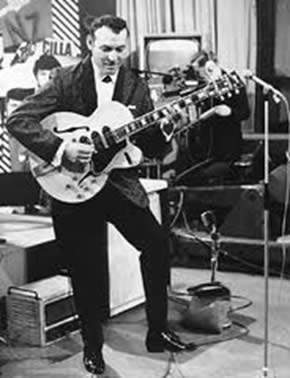 Carl Perkins was an American singer-songwriter who recorded most notably at the Sun Studio, in Memphis, Tennessee, beginning in 1954. His best-known song is “Blue Suede Shoes”.
Carl Perkins was an American singer-songwriter who recorded most notably at the Sun Studio, in Memphis, Tennessee, beginning in 1954. His best-known song is “Blue Suede Shoes”.
According to Charlie Daniels, “Carl Perkins’ songs personified the rockabilly era, and Carl Perkins’ sound personifies the rockabilly sound more so than anybody involved in it, because he never changed.” Perkins’ songs were recorded by artists (and friends) as influential as Elvis Presley, the Beatles, Jimi Hendrix, and Johnny Cash, which further established his place in the history of popular music. Paul McCartney claimed that “if there were no Carl Perkins, there would be no Beatles.”
Called “the King of Rockabilly”, he was inducted into the Rock and Roll Hall of Fame, the Rockabilly Hall of Fame, the Memphis Music Hall of Fame, and the Nashville Songwriters Hall of Fame. He also received a Grammy Hall of Fame Award.
Del Shannon (1934-1990)
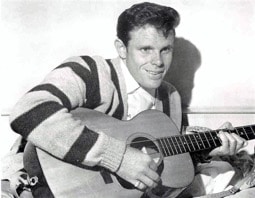
Del Shannon was an American rock and roll and country musician, and singer-songwriter who is best known for his 1961 No. 1 Billboard hit “Runaway”.
Harry Nilsson (1941-1994)
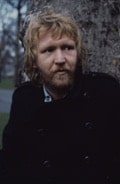 Harry Nilsson was an American singer-songwriter who achieved the peak of his commercial success in the early 1970s. His work is characterized by pioneering overdub experiments, returns to the Great American Songbook, and fusions of Caribbean sounds. A tenor with a three-and-a-half octave range, Nilsson was one of the few major pop-rock recording artists of his era to achieve significant commercial success without ever performing major public concerts or undertaking regular tours.
Harry Nilsson was an American singer-songwriter who achieved the peak of his commercial success in the early 1970s. His work is characterized by pioneering overdub experiments, returns to the Great American Songbook, and fusions of Caribbean sounds. A tenor with a three-and-a-half octave range, Nilsson was one of the few major pop-rock recording artists of his era to achieve significant commercial success without ever performing major public concerts or undertaking regular tours.
Born in Brooklyn, Nilsson fled to Los Angeles as a teenager and landed a job as a computer programmer at a bank. It was there that he cultivated an interest in musical composition and close-harmony singing, and was successful in having some of his songs recorded by various artists such as the Monkees, and later, Three Dog Night, who had a No. 5 hit with his song “One”. In 1967, he debuted on RCA Victor with the LP Pandemonium Shadow Show, followed with a variety of releases that include a collaboration with Randy Newman (Nilsson Sings Newman, 1970) and the original children’s story The Point! (1971).
After a brief period of widely publicized, alcohol-fueled antics with John Lennon—the two collaborating in 1974 for the album Pussy Cats—Nilsson left RCA, and his record output subsequently diminished. In response to Lennon’s 1980 death by shooting, he took a hiatus from the music industry to campaign for gun control. For the rest of his life, he recorded only on sporadic occasions. In 1994, Nilsson died of a heart attack while in the midst of recording new material for a since-unreleased comeback album.
David Bowie (1947-2016)
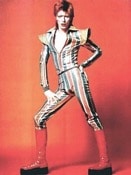 David Bowie was an English singer, songwriter and actor. He was a leading figure in popular music for over five decades, acclaimed by critics and other musicians for his innovative work. His career was marked by reinvention and visual presentation, his music and stagecraft significantly influencing popular music. During his lifetime, his record sales, estimated at 140 million albums worldwide, made him one of the world’s best-selling music artists. In the UK, he was awarded nine platinum album certifications, eleven gold and eight silver, releasing eleven number-one albums. In the US, he received five platinum and nine gold certifications. He was inducted into the Rock and Roll Hall of Fame in 1996.
David Bowie was an English singer, songwriter and actor. He was a leading figure in popular music for over five decades, acclaimed by critics and other musicians for his innovative work. His career was marked by reinvention and visual presentation, his music and stagecraft significantly influencing popular music. During his lifetime, his record sales, estimated at 140 million albums worldwide, made him one of the world’s best-selling music artists. In the UK, he was awarded nine platinum album certifications, eleven gold and eight silver, releasing eleven number-one albums. In the US, he received five platinum and nine gold certifications. He was inducted into the Rock and Roll Hall of Fame in 1996.
Born in Brixton, South London, Bowie developed an interest in music as a child, eventually studying art, music and design before embarking on a professional career as a musician in 1963. “Space Oddity” became his first top-five entry on the UK Singles Chart after its release in July 1969. After a period of experimentation, he re-emerged in 1972 during the glam rock era with his flamboyant and androgynous alter ego Ziggy Stardust. The character was spearheaded by the success of his single “Starman” and album The Rise and Fall of Ziggy Stardust and the Spiders from Mars, which won him widespread popularity. In 1975, Bowie’s style shifted radically towards a sound he characterised as “plastic soul”, initially alienating many of his UK devotees but garnering him his first major US crossover success with the number-one single “Fame” and the album Young Americans. In 1976, Bowie starred in the cult film The Man Who Fell to Earth, directed by Nicolas Roeg, and released Station to Station. The following year, he further confounded musical expectations with the electronic-inflected album Low (1977), the first of three collaborations with Brian Eno that would come to be known as the “Berlin Trilogy”. “Heroes” (1977) and Lodger (1979) followed; each album reached the UK top five and received lasting critical praise.
After uneven commercial success in the late 1970s, Bowie had UK number ones with the 1980 single “Ashes to Ashes”, its parent album Scary Monsters (And Super Creeps), and “Under Pressure”, a 1981 collaboration with Queen. He then reached his commercial peak in 1983 with Let’s Dance, with its title track topping both UK and US charts. Throughout the 1990s and 2000s, Bowie continued to experiment with musical styles, including industrial and jungle. He also continued acting; his roles included Major Celliers in Merry Christmas, Mr. Lawrence (1983), the Goblin King Jareth in Labyrinth (1986), Pontius Pilate in The Last Temptation of Christ (1988), and Nikola Tesla in The Prestige (2006), among other film and television appearances and cameos. He stopped concert touring after 2004 and his last live performance was at a charity event in 2006. In 2013, Bowie returned from a decade-long recording hiatus with the release of The Next Day. He remained musically active until he died of liver cancer two days after the release of his final album, Blackstar (2016).
Prince (1958-2016)
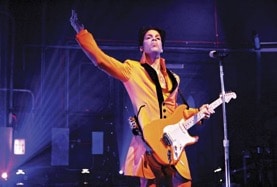 Prince was an American singer, multi-instrumentalist, songwriter, and record producer. He was a musical innovator who was known for his eclectic work, flamboyant stage presence, extravagant dress and makeup, and wide vocal range. His music integrates a wide variety of styles, including funk, rock, R&B, new wave, soul, psychedelia, and pop. He has sold over 100 million records worldwide, making him one of the best-selling artists of all time. He won seven Grammy Awards, an American Music Award, a Golden Globe Award, and an Academy Award for the film Purple Rain. He was inducted into the Rock and Roll Hall of Fame in 2004, his first year of eligibility.
Prince was an American singer, multi-instrumentalist, songwriter, and record producer. He was a musical innovator who was known for his eclectic work, flamboyant stage presence, extravagant dress and makeup, and wide vocal range. His music integrates a wide variety of styles, including funk, rock, R&B, new wave, soul, psychedelia, and pop. He has sold over 100 million records worldwide, making him one of the best-selling artists of all time. He won seven Grammy Awards, an American Music Award, a Golden Globe Award, and an Academy Award for the film Purple Rain. He was inducted into the Rock and Roll Hall of Fame in 2004, his first year of eligibility.
Prince was born in Minneapolis and developed an interest in music as a young child. He signed a recording contract with Warner Bros. at the age of 18, and released his debut album For You in 1978. His 1979 album Prince went platinum, and his next three records—Dirty Mind (1980), Controversy (1981), and 1999 (1982)—continued his success, showcasing Prince’s prominently sexual lyrics and blending of funk, dance, and rock music.
In 1984, he began referring to his backup band as the Revolution and released Purple Rain, the soundtrack album to his eponymous 1984 film debut. It quickly became his most critically and commercially successful release, spending 24 consecutive weeks atop the Billboard 200 and selling over 20 million units worldwide. After releasing the albums Around the World in a Day (1985) and Parade (1986), The Revolution disbanded, and Prince released the double album Sign o’ the Times (1987) as a solo artist. He released three more solo albums before debuting the New Power Generation band in 1991.
In 1993, while in a contractual dispute with Warner Bros., he changed his stage name to , an unpronounceable symbol also known as the “Love Symbol”, and began releasing new albums at a faster pace to remove himself from contractual obligations. He released five records between 1994 and 1996 before signing with Arista Records in 1998. In 2000, he began referring to himself as “Prince” again. He released 16 albums after that, including the platinum-selling Musicology (2004). His final album, Hit n Run Phase Two, was first released on the Tidal streaming service on December 12, 2015. Prince died from a fentanyl overdose at his Paisley Park recording studio and home in Chanhassen, Minnesota, on April 21, 2016, at the age of 57.
Johnny Cash (1932-2003)
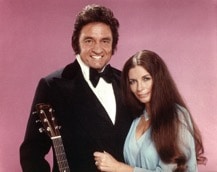 Johnny Cash was an American singer-songwriter, guitarist, actor, and author. He is widely considered one of the most influential popular musicians of the 20th century and is one of the best-selling music artists of all time, having sold more than 90 million records worldwide. Although primarily remembered as a country music icon, his genre-spanning songs and sound embraced rock and roll, rockabilly, blues, folk, and gospel. This crossover appeal won Cash the rare honor of multiple inductions in the Country Music, Rock and Roll, and Gospel Music Halls of Fame.
Johnny Cash was an American singer-songwriter, guitarist, actor, and author. He is widely considered one of the most influential popular musicians of the 20th century and is one of the best-selling music artists of all time, having sold more than 90 million records worldwide. Although primarily remembered as a country music icon, his genre-spanning songs and sound embraced rock and roll, rockabilly, blues, folk, and gospel. This crossover appeal won Cash the rare honor of multiple inductions in the Country Music, Rock and Roll, and Gospel Music Halls of Fame.
Cash was known for his deep, calm bass-baritone voice, the distinctive sound of his Tennessee Three backing band, which is characterized by train-sound guitar rhythms; a rebelliousness coupled with an increasingly somber and humble demeanor, free prison concerts, and a trademark, all-black stage wardrobe, which earned him the nickname “The Man in Black.”] He traditionally began his concerts by simply introducing himself, “Hello, I’m Johnny Cash,” followed by his signature song “Folsom Prison Blues”.
Much of Cash’s music contained themes of sorrow, moral tribulation, and redemption, especially in the latter stages of his career. His signature songs include “I Walk the Line”, “Folsom Prison Blues”, “Ring of Fire”, “Get Rhythm”, and “Man in Black”. He also recorded humorous numbers like “One Piece at a Time” and “A Boy Named Sue”; a duet with his future wife, June Carter, called “Jackson” (followed by many further duets after their marriage); and railroad songs including “Hey, Porter”, “Orange Blossom Special” and “Rock Island Line”.
Bobby Fuller (1942-1966)
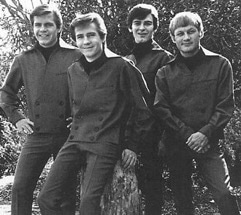 Bobby Fuller (1942-1966) was an American rock singer, songwriter, and guitarist best known for “Love’s Made a Fool of You” and his cover of “I Fought the Law”, recorded with his mid-1960s group The Bobby Fuller Four.
Bobby Fuller (1942-1966) was an American rock singer, songwriter, and guitarist best known for “Love’s Made a Fool of You” and his cover of “I Fought the Law”, recorded with his mid-1960s group The Bobby Fuller Four.
